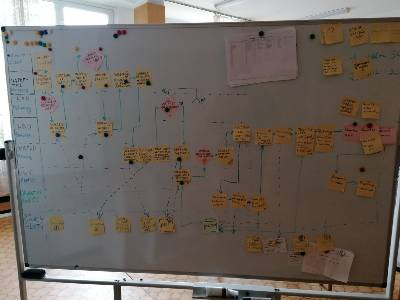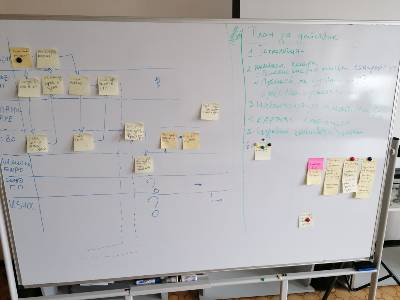Lean in Administration
or “Efficient Business Processes, presented through a fun simulation"
Why Lean in Administration?
- The main focus for improvements is only in production.

Administrative processes BEFORE
- The remaining processes are not analyzed and there is no connection between them.
- We don't know how to look for losses/wastes in administrative processes.
- You want to know what are the methods and procedures for improving administrative processes.
What is Lean in Administration?
Lean in Administration is an adaptation of the proven methods of Lean production to the specific requirements of administrative processes. Or optimization of all activities, by removing the the waste. Eliminating waste starts with analysis of each step of the process. Analysis tools are similar to these, which are used to analyze production processes. The main goal is simplification and removal on redundant activities, and creating a transparent process, which is controlled and measured, through well-visualized metrics.
Through training:
- We will get to know the 8 administrative wastes

Administrative processes AFTER
processes;
- We will find out what the methods and tools of analysis are;
- We will learn what the 6 hallmarks of effective processes are;
- We're going to play a silly game, in which we will simulate administrative processes and aim to improve them in several stages, by applying what has already been learned.
Audience:
- Managers and heads of departments:
- Functional managers: Managers of administrative departments such as HR, finance, accounting, marketing and sales.
- Project managers: Project leaders, who want to implement Lean principles in project management.
- Middle management: Team Leaders and Supervisors, who are responsible for the day-to-day management of administrative processes.
- Administrative personal:
- Office workers: Staff, which performs day-to-day administrative tasks and processes.
- Maintenance specialists: Employees, which support various systems and processes in the administration.
- Process analysts and quality improvement specialists:
- Process Engineers: Specialists, who analyze and improve processes in administrative departments.
- Quality coordinators: Employees, who are responsible for maintaining quality standards in administrative processes.
- IT specialists:
- IT managers: Heads of IT departments, who want to optimize administrative IT processes.
- Business analysts: Specialists, who analyze business processes and work on their optimization through IT solutions.
- HR specialists and coaches:
- HR managers: Human resource managers, who want to optimize HR processes.
- Coaches and trainers: Specialists, who are responsible for staff development and want to implement Lean principles in training programs.
- Employees at various administrative levels:
- Administrative services experts: Employees, which deal with the maintenance and optimization of administrative services.
- Coordinators and assistants: Employees, which support day-to-day administrative activities and processes.
Audience benefits:
- For managers: They will receive tools and methodologies to improve process management and increase efficiency in their departments.
- For administrative staff: They will learn how to optimize their daily tasks and processes, reducing waste and improving the quality of your work.
- For process analysts: They will gain knowledge about analysis and improvement of administrative processes through Lean methodologies.
- For IT professionals: They will learn how to apply Lean principles in IT processes and how to support administrative departments with effective IT solutions.
- For HR professionals: They will learn how to implement Lean principles in human resource management and training programs
Learning aids used:
Presentation, discussions and a simulation game.
Themes:
- Relationship between Lean Manufacturing and Lean Administration.
- 8-they waste in administrative processes.
- Methods and tools for the analysis of administrative processes
- Characteristics of effective processes and procedures
- A simulation game
This training will help all participants to understand and apply Lean principles in the administrative environment, leading to better efficiency, reducing losses and improving the quality of work.




